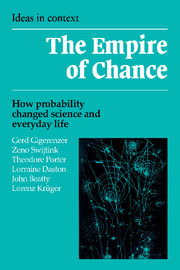Book contents
- Frontmatter
- Dedication
- Contents
- Acknowledgments
- Introduction
- 1 Classical probabilities, 1660–1840
- 2 Statistical probabilities, 1820–1900
- 3 The inference experts
- 4 Chance and life: controversies in modern biology
- 5 The probabilistic revolution in physics
- 6 Statistics of the mind
- 7 Numbers rule the world
- 8 The implications of chance
- References
- Name index
- Subject index
8 - The implications of chance
Published online by Cambridge University Press: 05 December 2013
- Frontmatter
- Dedication
- Contents
- Acknowledgments
- Introduction
- 1 Classical probabilities, 1660–1840
- 2 Statistical probabilities, 1820–1900
- 3 The inference experts
- 4 Chance and life: controversies in modern biology
- 5 The probabilistic revolution in physics
- 6 Statistics of the mind
- 7 Numbers rule the world
- 8 The implications of chance
- References
- Name index
- Subject index
Summary
Il faut parier.
Blaise Pascal (1669)PROBABILISTIC IMPERIALISM
The empire of chance began with an unsteady foothold in gambling problems some three hundred years ago and now sprawls over whole conceptual continents. All of the natural and social sciences belong to its territories, and there have been conquests – cliometrics, statistical comparisons of literary style – even in the humanities. It also encompasses important parts of law, medicine, industry, and practical economics, and, in its descriptive statistical aspect, has breached almost every wall. Insofar as we listen to weather reports, ponder political polls, undergo medical tests, pursue the sciences, plot the standard of living index, buy insurance, or even read the newspaper, we are all its subjects.
In these pages we have followed the steady and occasionally explosive growth of this empire as probability theory and statistics evolved as mathematical disciplines and at the same time acquired ever more diverse applications. These developments of course went hand-in-hand, but the mere existence of a new mathematical technique was not sufficient in itself to win the theory new applications. Here interpretation and analogy played critical roles, as we have seen. Whether probability was interpreted as a degree of certainty, as a relative frequency, as a propensity, or in some other way, determined the plausibility of particular applications, be they to evaluations of legal evidence or to life insurance.
- Type
- Chapter
- Information
- The Empire of ChanceHow Probability Changed Science and Everyday Life, pp. 271 - 292Publisher: Cambridge University PressPrint publication year: 1989



